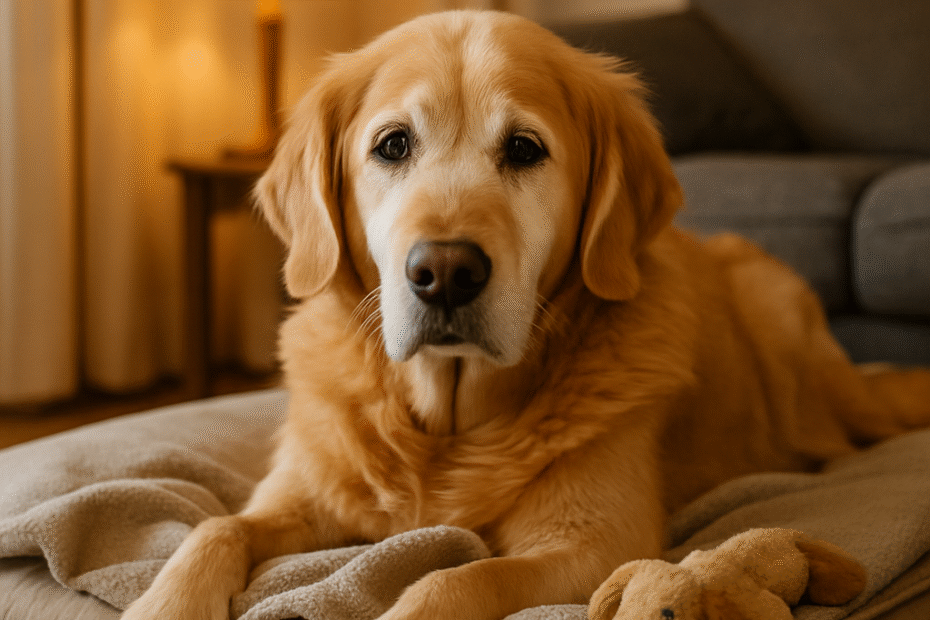Getting older isn’t just a human experience. Our dogs go through changes too, some subtle, some more obvious. In this blog, I want to talk about supporting your senior dog’s changing needs, not through dramatic lifestyle overhauls, but with small, thoughtful shifts that help them feel safe, seen, and supported. Now that the weather is colder we’re revisiting some information to support our senior Furkids.
Whether it’s your dog slowing down on walks, struggling to settle at night, or becoming more sensitive to noise or touch, these changes can take us by surprise. Often, we think of ageing as a gradual decline in physical ability, but for dogs, it’s not just about stiff joints or greying fur. It’s a change in how they experience the world and how we respond to those changes matters.
Recognising What’s Changed and What Hasn’t
It’s easy to miss the early signs of ageing because many of them overlap with general behaviour shifts. A once sociable dog might become more selective about company. A previously unbothered sleeper may start waking up in the night or seem restless. These aren’t just ‘old dog things’ to be brushed off. They’re invitations for us to adapt.
Supporting your senior dog’s changing needs means taking a moment to ask: Is this discomfort? Is it confusion? Is it a need that’s no longer being met in the same way? Dogs rarely act out without reason, and in their later years, behaviour changes are often the only way they can tell us something isn’t right.
Rethinking Routines, Not Removing Joy
One of the most powerful things we can do is reframe what enrichment and training look like for older dogs. Tug might not be their game of choice anymore, but that doesn’t mean play disappears. A gentle scent game in the garden. A soft-textured snuffle mat. A low-impact version of their favourite puzzle. These small acts honour who they are now, not just who they used to be.
Mobility is another big consideration. You might notice hesitation when jumping into the car or climbing the stairs. Ramps, rugs for traction, raised bowls. These aren’t luxury items, they’re tools for comfort. And if you’re still asking your dog to sit every time they greet you, it might be time to check if it’s causing strain. Supporting your senior dog’s changing needs includes adjusting our expectations, not just their environment.
Behaviour Isn’t Set in Stone
Just because a dog is older doesn’t mean they stop learning. In fact, older dogs can absolutely benefit from ongoing training, particularly training that helps them cope with the changes they’re experiencing. Cooperative care routines, soft recall games, and cue refreshers aren’t just for puppies. They help seniors maintain confidence and predictability in their daily lives.
Some older dogs may also become more vocal, more clingy, or more distant. These shifts can be unsettling, but they’re often rooted in sensory decline or confusion. Vision, hearing, and even spatial awareness can all fade slowly, leaving dogs unsure about where they are or what’s happening. With the right support, many of these behaviours can be eased — but only if we’re willing to see them for what they are: communication.
Be Their Constant
At the heart of it all, supporting your senior dog’s changing needs is about being their constant in a world that’s becoming harder for them to navigate. You don’t need to have all the answers. But if you’re showing up with softness, patience, and a willingness to tweak the routine then you’re doing right by them.
It might mean shorter walks. Or longer sniffs. More quiet time. Or more cuddles. Whatever it is, they’ll notice. And they’ll thank you in their own way. Maybe not with a tail wag like they used to, but with a long sigh and a gentle lean into your leg. It’s not the same but it’s still love.
Of course, I highly recommend that any changes in your dog’s health or behaviour be checked out by your veterinarian. You can also find some more information on dog training and behaviour at the Pet Professional Guild Australia website. Or, you can read some of my previous blog posts here. I’d especially recommend you check out my blog Teaching Old Dogs New Tricks Through Playful Training.
Game On! Let’s Play!
Hxx
Written with the assistance of AI

